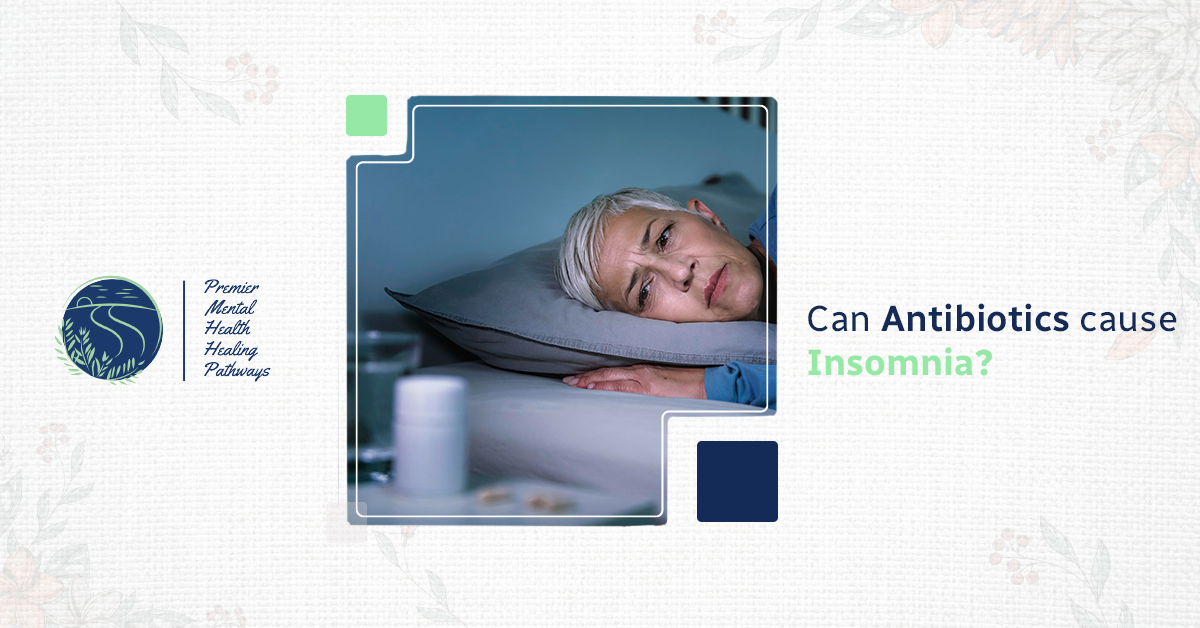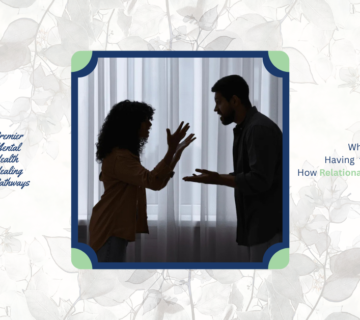Doctors use antibiotics as powerful drugs to eliminate bacterial infections. Antibiotics exist to help fight diseases, yet they can trigger undesired effects for the body during treatment.
The majority of patients wonder, “Can antibiotics cause insomnia?” Many people experience difficulties sleeping during antibiotic use, according to medical reports.
The following section reviews how antibiotics trigger sleep difficulties.
At Premier Mental Health Healing Pathways, we ensure your medications support you. Our Medication Management Services keep you on track with effective treatment.
We focus on minimizing side effects, like sleep issues. Our experts provide personalized care and guidance for a healthier, more restful life. Contact us.
What Are Antibiotics?
Antibiotics serve as medical agents that combat bacterial systems that produce human diseases. The drugs act by destroying the microorganisms or stopping their growth.
The antibiotics used in most cases are penicillin and its substitutes and also the drugs Amoxicillin, as well as Augmentin, come in combination.
Understanding Insomnia
Insomnia involves two main symptoms:
- Difficulty falling asleep
- Staying asleep
People with insomnia often face these issues:
- The sleep onset takes such a long time that it causes difficulties before finally drifting off to sleep.
- People who have insomnia wake up repeatedly throughout their nighttime rest period.
- People experience early morning wakefulness when they have insomnia.
- Fatigue sets in each time you wake in the morning.
Can Antibiotics Cause Insomnia?
Antibiotics create insomnia as a possible side effect for particular people. The primary bacterial infections that antibiotics target can disrupt sleep and affect other body systems.
Insomnia from antibiotic use varies by person. This variation depends on how reactive someone is, the sort of antibiotic, and how it connects with their body.
Why Do Antibiotics Cause Sleeplessness?
Many reasons are explaining why antibiotics can have an impact on the sleep state:
-
Impact on Gut Health
The microbial community in the gut, or the gut microbiome, is disrupted by antibiotics, causing discomfort in digestion that can cause poor sleep patterns.
-
Nervous System Stimulation
Nervous system overactivity is one of the effects of antibiotics like fluoroquinolones, resulting in anxiousness, restlessness, and sleeping difficulty.
-
Histamine Release
In the case of antibiotics, histamine release can happen, resulting in allergic reactions, inflammation, and disturbed sleep.
-
Increased Heart Rate
The use of certain antibiotics also increases the risk of palpitates and higher heart rate, and this by itself can be a preventer of one being relaxed enough to go to sleep.
-
Drug Interactions
The intake of antibiotics can also be combined with many other drugs, including some sedatives, thus lowering their strength.
Other Antibiotics Side Effects That Affect Sleep
Besides antibiotics and sleeplessness, some antibiotics may cause:
- Nightmares: Many people claim that amoxicillin causes them to have nightmares.
- Upset Stomach: It can simply be a reason for insomnia.
- Dizziness: In taking some medicines, one may be prone to vertigo, which makes it difficult to relax muscles and fall asleep.
- Restlessness: This can happen when you feel too active (agitated, anxious) and can’t relax before sleep. Antibiotics may cause this.
Can Amoxicillin Keep You Awake?
Amoxicillin is not known to cause insomnia directly. However, some people say that they have sleep problems when they take it. Some things can often cause restlessness or poor sleep quality, such as:
- An upset stomach
- Histamine response
- Mild nervous system stimulation
Does Augmentin Cause Insomnia?
Augmentin is a combination of amoxicillin and clavulanic acid, the most common side effects of which may also be to blame.
It is a fact that sometimes after taking Augmentin people may feel unwell, have trouble falling asleep, be turning and tossing, or even feel very happy.
Use Augmentin in the morning. In addition, remember to take enough liquid to get the desired effect.
Does Amoxicillin Make You Tired?
In addition to insomnia, others may also feel exhausted due to the medication. Antibiotics, including amoxicillin, can cause immune activation, which may cause fatigue, or it can occur as a side effect of the drug.
Can You Take Amoxicillin and Melatonin Together?
It is legitimate to use Amoxicillin with Melatonin under medical consultation. Melatonin has been known to be a natural sleep aid that can complement insomnia that comes from antibiotics.
Yet, people should remember to initiate a conversation with a medical professional before mixing any drugs.
When to Talk to a Doctor
If you experience severe amoxicillin insomnia, contact your doctor. Also, seek medical advice if you have:
- Persistent insomnia after stopping antibiotics.
- Major fatigue impacting daily routines.
- Troubling nightmares or strange dreams alter sleep quality.
- Other serious side effects impact your overall well-being.
Your healthcare provider may recommend a trial of a different antibiotic, have your drug dose distributed differently, or try other sleep-improving therapy options.
How to Improve Sleep While Taking Antibiotics?
Are you having a sleep issue owing to being on antibiotics? You can try these approaches:
-
Take the Antibiotics Earlier in the Day
It can mitigate their influence on sleep.
-
Drink Water
Try to drink enough water so that the side effects of the antibiotic can be reduced.
-
Have Probiotic-Rich Foods
Probiotic-containing foods help to improve the balance of the gut bacteria in the body. Some of them are yogurt, probiotic drinks, and fermented foods.
-
Carry Out a Bedtime Routine
It’s time to turn in, so follow the nightly traditions of a soft and peaceful nature.
-
Avoid the Stimulants
Lower levels of caffeine and alcohol in your daily food intake while receiving antibiotic treatment.
-
Try Relaxation Exercises
Position yourself comfortably and take a minute to meditate, inhale fully, and softly stretch, which can lead you to restorative sleep.
Struggling With Sleep While Taking Antibiotics? You’re Not Alone
If you’re wondering “can antibiotics cause insomnia” or experiencing sleep problems while taking medications like amoxicillin or Augmentin, professional support can help.
At Premier Mental Health Healing Pathways in Castle Rock, CO, our medication management team works with you to reduce side effects, improve sleep, and support your overall mental health.
Contact Premier Mental Health Healing Pathways today to discuss your symptoms. Call 720-525-5231 or book an appointment online for personalized care.
FAQs
Can I take amoxicillin at night?
You are permitted to take amoxicillin at night if your doctor allows. Always adhere to the instructions on how to take it. If it affects your sleep at night, try to take it in the early morning.
Can antibiotics cause sleeplessness?
Antibiotics adjust gut microorganisms. These modifications assist in modifying neurotransmitters, which subsequently generate substances in the body. The medications activate the nervous system functions. Sleeplessness happens to particular persons as a result of the medication.
How long do sleep disturbances last after antibiotics?
Humans are commonly restored from sleep irregularities after the finalization of antibiotic medication. Follow the instructions should symptoms not go away.





No comment